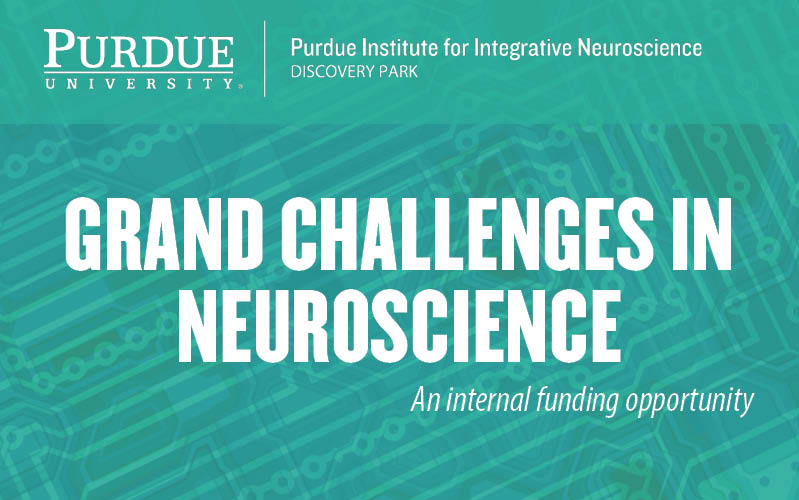Request for applications: Grand Challenges in Neuroscience
August 13, 2019
BACKGROUND
The Purdue Institute for Integrative Neuroscience (PIIN) hosted a Life Sciences-Engineering Workshop Series throughout the summer of 2019. The overarching goal of the workshops was to identify major problems in neuroscience that would best be addressed by an interdisciplinary approach spanning the life sciences and engineering. This request for applications is a follow-up to the workshop series, designed as the final step to create teams of Purdue colleagues equipped to solve these problems. Research areas that have been discussed include addiction, neurodegenerative disorders, hearing science, traumatic brain injury, neurocircuitry, autism, and the gut brain microbiome, although proposals relevant to other areas of neuroscience are also of interest.
DESCRIPTION
PIIN will award up to a total of $1,000,000 to 6-10 project teams for a one-year project period. Additional funding may be available upon completion of agreed upon milestones. Purdue faculty members are eligible to apply.
Proposals will be evaluated based on the following criteria:
- significance and innovation of the research
- scientific merit/rigor of the approach
- rationale for the roles of research team members
- strategies for generating new, extramural grant support
- benefits to the PIIN community
APPLICATION
Proposals (single-spaced, 1/2 inch margins on all sides, font size of 11 points or larger) must include four sections:
(i) Research plan (2-page limit)
This section should be organized as follows:
- Specific Aims
- Significance (How will the research address a major question in neuroscience? Why would answering this question represent a major advance in the field?)
- Innovation (How will the project make use of new technologies at the interface of the life sciences and engineering, or the life sciences and data science? How will the research help advance new concepts that will challenge the status quo in the field? Why is Purdue the best place to develop these technological and conceptual innovations?
- Approach (What is the team’s plan for meeting the project goals? How will Purdue resources be leveraged? What are the expected outcomes, and how will they help answer the major question?)
- Milestones (What are the project deliverables, what are the quantitative metrics for success, and what is the timeline for milestone completion?)
(ii) Team contributions (2-page limit)
For each team member, provide a brief (2- to 3-sentence) description of his/her expertise and role played within the team. Various roles are acceptable (e.g., some team members may actively direct research in their labs, whereas others may serve as consultants).
(iii) Extramural funding strategy (1-page limit)
Provide an outline of steps that will be taken to procure external funding after the period of PIIN support. This section should clearly describe how completion of each of the milestones would aid in either “jump-starting” a project or strengthening a planned or pending submission. Potential categories of extramural funding (e.g. philanthropic, government, corporate partnership), as well as specific sponsors or funding mechanisms within each category, should be indicated.
(iv) Broad impact to PIIN community (1/2 page limit)
Explain how successful completion of the project milestones will benefit other colleagues in PIIN. Describe how resources developed during the period of PIIN support (e.g. datasets, reagents, biospecimens, technologies, equipment) will be made accessible to the Purdue neuroscience community.
(v) Budget and justification (2 page limit)
Provide a line-item budget with a brief justification (proposals do not need to be certified by the Pre-Award Center). Funds can be used for laboratory personnel and supplies/expenses, but not for faculty AY salaries. Travel and equipment expenses can be budgeted but must be clearly justified.
Applications must be submitted as a single PDF document to neuro@purdue.edu by Monday, September 16, 2019 at 9:00 am. A project start date of October 15, 2019 is anticipated.
Teams receiving PIIN support will agree to reporting requirements and a community-oriented approach to any technology, equipment, and unique datasets created. A major goal of this initiative is to position teams of PIIN investigators to be highly competitive for extramural funding opportunities. Therefore, teams selected for funding are expected to engage with PIIN leadership during and after the period of PIIN support.
Questions about this opportunity should be directed to neuro@purdue.edu.


